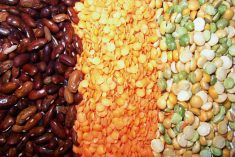MarketsFarm — As hot and dry weather, especially in Western Canada, have wrought havoc on Canadian pulse crops and raised prices, it’s also becoming more difficult to export pulses overseas.
Shipping containers, in which 30 per cent of Canada’s peas and more than 50 per cent of Canada’s lentils are transported, are currently in a shortage.
At the start of the COVID-19 pandemic, China stopped shipping containers to importing countries such as Canada, resulting in cancelled sailings from January to May 2020, according to a report.
Read Also

Alberta crop conditions improve: report
Varied precipitation and warm temperatures were generally beneficial for crop development across Alberta during the week ended July 8, according to the latest provincial crop report released July 11.
As demand for goods increased, containers which were emptied at ports around the world were quickly being sent back to China to be refilled, increasing revenue for shipping companies but causing logistical headaches for pulse and special crop exporters.
“Some of the forecasts for the fall, particularly for the West Coast, said we will be down in terms of capacity. One of the biggest problems is that we can’t get containers inland,” said Marlene Boersch of Mercantile Consulting Venture in Winnipeg.
“In my mind, we’ll be using more trucks…which will add to costs again.”
Compounding the issue of container availability has been the rising prices for shipping containers, according to Boersch.
“Some routes are hard to book, because as soon as you have one or two train shipments, it becomes very unattractive for the container companies who obviously are trying to shorten the turnaround times,” she said.
“We are probably looking at smaller container volumes shipped, especially off the West Coast, for this fall, which is always bad news because the second we have very good fall shipments, it reduces the volume left for later and it tends to increase prices.”
Boersch also believes the problem is too far gone for the Canadian government to provide meaningful intervention as a remedy.
— Adam Peleshaty reports for MarketsFarm from Winnipeg.




















